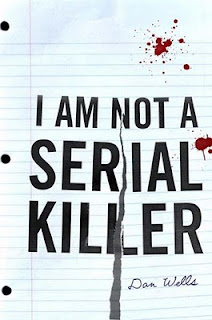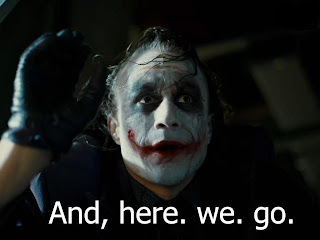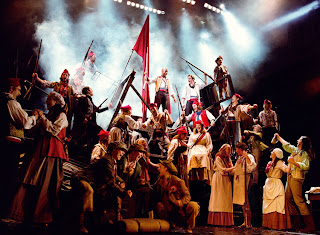 We're going to start off the proceedings with an entirely new author! His name's Dan Wells, and writing about creepy guys is his specialty. He's only got two books published as of now, the first two books in a trilogy, and I've had the priviledge of reading them both. Here's the thing: Dan Wells is one of the most promising new writers I've read in recent memory, and I Am Not A Serial Killer is a real genre-defying delight.
We're going to start off the proceedings with an entirely new author! His name's Dan Wells, and writing about creepy guys is his specialty. He's only got two books published as of now, the first two books in a trilogy, and I've had the priviledge of reading them both. Here's the thing: Dan Wells is one of the most promising new writers I've read in recent memory, and I Am Not A Serial Killer is a real genre-defying delight.The Writer's Notebook
Thoughts while writing. In the immortal words of Stephen King, "the adverb is not your friend."
Friday, November 26, 2010
I Am Not A Serial Killer
 We're going to start off the proceedings with an entirely new author! His name's Dan Wells, and writing about creepy guys is his specialty. He's only got two books published as of now, the first two books in a trilogy, and I've had the priviledge of reading them both. Here's the thing: Dan Wells is one of the most promising new writers I've read in recent memory, and I Am Not A Serial Killer is a real genre-defying delight.
We're going to start off the proceedings with an entirely new author! His name's Dan Wells, and writing about creepy guys is his specialty. He's only got two books published as of now, the first two books in a trilogy, and I've had the priviledge of reading them both. Here's the thing: Dan Wells is one of the most promising new writers I've read in recent memory, and I Am Not A Serial Killer is a real genre-defying delight.I'm Back!

Tuesday, September 28, 2010
Classic of the Month: Les Miserables
 Hi, there. I think it's time I wrote about what is quite possibly the best book I have ever read. This time on Classic of the Month, I'm going to take a look at the greatest thing to come out of France, and one of those books EVERY PERSON should read before they die. Period. I am of course referring to Les Miserables by Victor Hugo.
Hi, there. I think it's time I wrote about what is quite possibly the best book I have ever read. This time on Classic of the Month, I'm going to take a look at the greatest thing to come out of France, and one of those books EVERY PERSON should read before they die. Period. I am of course referring to Les Miserables by Victor Hugo.
2. The Raw Emotion. Another sign that this novel is indeed French is the sheer peaks and valleys the characters go through. Fantine's struggles, Valjean's sacrifices, Javert's epiphanies, Marius and Cosette's unrequited love, and the fierce passion of the barricade all hit the reader hard (or at least this reader). I found myself on multiple occasions reaching for a tissue when such an action seems unusual for me. It's all so stunning and beautiful, but at the same time like daggers to the heart. What more can I say? It's Les Miserables.
1. Jean Valjean. He is the focus of Les Miserables, the crux of the action, the reason the novel is the classic that it is. Released from jail on parole (he was there for nineteen years for stealing a loaf of bread), an encounter with a merciful bishop turns his life around. His goal is at first just to escape, but slowly he changes and wants to make a difference in the world. He strives to prove Javert wrong, that people can change, and he puts his life on the line time after time for other people when he has no reason to at all. His story is the entire point of Victor Hugo's novel, and it is an unforgettable one.
So there you have it. I don't have much more to say that wouldn't seem like mindless ramblings, although I could do those about the novel for hours. Now go read it. Enjoy it. I know you will.
My rating: 11/10. (I know, I know. It seems immature. So sue me.)
Sunday, September 19, 2010
Chuck: Season 3
 It's time for a new season of television to begin! That means it's time for me to stop being lazy and post some reviews for TV! I'll start with a show whose fourth season has its premiere tomorrow night: the imcomparable, unstoppable Chuck.
It's time for a new season of television to begin! That means it's time for me to stop being lazy and post some reviews for TV! I'll start with a show whose fourth season has its premiere tomorrow night: the imcomparable, unstoppable Chuck.Saturday, September 18, 2010
Dean Koontz
 Relentless: This one is the more recent (and worse written) of the two. Now, I haven't read nearly enough to call myself an expert on Koontz, but I'm going to assume the style is a bit different from his usual thrillers. In Relentless, Koontz strives to keep things more tongue-in-cheek. The overall effect, however, is jarring considering the situations the characters find themselves in. Half the time, he seems to want us to take things seriously, be concerned for it all, and the other half of the time, he seems to be laughing at himself. In this volume, I'm not sure which works better, because the story is far-fetched enough to warrant many a raised eyebrow.
Relentless: This one is the more recent (and worse written) of the two. Now, I haven't read nearly enough to call myself an expert on Koontz, but I'm going to assume the style is a bit different from his usual thrillers. In Relentless, Koontz strives to keep things more tongue-in-cheek. The overall effect, however, is jarring considering the situations the characters find themselves in. Half the time, he seems to want us to take things seriously, be concerned for it all, and the other half of the time, he seems to be laughing at himself. In this volume, I'm not sure which works better, because the story is far-fetched enough to warrant many a raised eyebrow. Velocity: Now there's why this guy is so popular. Interesting moral dilemmas, dangerous situations, tense moments, and a anil-biting roller coaster ride all around. The protagonist is more normal this time around (except for the violent and traumatic backstory, which seems so far to be a Koontz staple), and his descent into paranoia and the gray areas of morality are extremely compelling and vivid. I couldn't put the book down, and I didn't want to.
Velocity: Now there's why this guy is so popular. Interesting moral dilemmas, dangerous situations, tense moments, and a anil-biting roller coaster ride all around. The protagonist is more normal this time around (except for the violent and traumatic backstory, which seems so far to be a Koontz staple), and his descent into paranoia and the gray areas of morality are extremely compelling and vivid. I couldn't put the book down, and I didn't want to.Monday, September 6, 2010
Old Man's War
 I've had a bit of a backlog of books to review for a while, so I thought that while I read The Way of Kings (which is fantastic so far, but I'm trying not to read it too fast, and it's really long), I'd get through some of them. The first of these showcases a negligible hole in my reading: Sci-Fi. I love the genre on film, as well as the pseudo-sci-fi movies like STAR WARS, but in book form, I've read hardly any of it. I've read most of Orson Scott Card's Ender and Bean books at some time or another, with the exceptions of the most recent volumes. I've read some Asimov. A fair bit of Bradbury. A smidgen of Peter F. Hamilton, but not enough to formulate my opinions on the author. And that's it, for my entire life.
I've had a bit of a backlog of books to review for a while, so I thought that while I read The Way of Kings (which is fantastic so far, but I'm trying not to read it too fast, and it's really long), I'd get through some of them. The first of these showcases a negligible hole in my reading: Sci-Fi. I love the genre on film, as well as the pseudo-sci-fi movies like STAR WARS, but in book form, I've read hardly any of it. I've read most of Orson Scott Card's Ender and Bean books at some time or another, with the exceptions of the most recent volumes. I've read some Asimov. A fair bit of Bradbury. A smidgen of Peter F. Hamilton, but not enough to formulate my opinions on the author. And that's it, for my entire life.Thursday, August 26, 2010
Mockingjay
 I'm writing this after taking only a few minutes to collect my thoughts on what is probably the biggest YA release of the past few years. Mockingjay brings to a close the events Suzanne Collins began in The Hunger Games and Catching Fire. By the way, before I launch in to review this book, which will undoubtedly be absurdly polarizing for its fans (how many times have I used that word this month?), I'd like to point out that there will be spoilers for the first couple of books. Unavoidable, I'm afraid, but you should really have read them by now. Go ahead. They're quick reads. You can finish the whole trilogy in a week without a problem.
I'm writing this after taking only a few minutes to collect my thoughts on what is probably the biggest YA release of the past few years. Mockingjay brings to a close the events Suzanne Collins began in The Hunger Games and Catching Fire. By the way, before I launch in to review this book, which will undoubtedly be absurdly polarizing for its fans (how many times have I used that word this month?), I'd like to point out that there will be spoilers for the first couple of books. Unavoidable, I'm afraid, but you should really have read them by now. Go ahead. They're quick reads. You can finish the whole trilogy in a week without a problem.